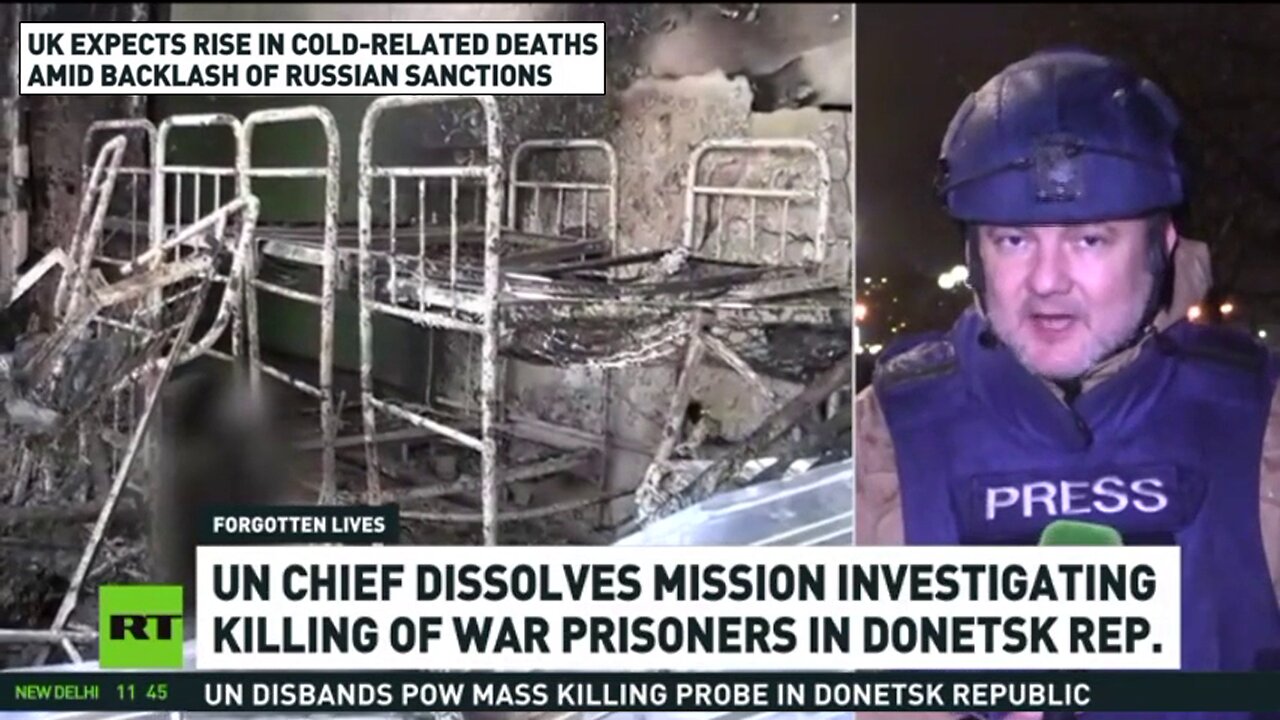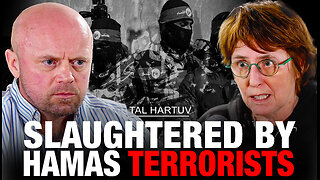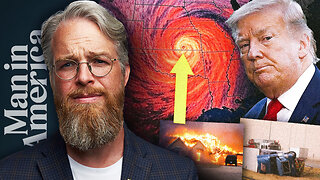Premium Only Content

RT News - January 6th 2023
'A violation of free speech and the rights of journalists' - that's what Russia's Foreign Ministry calls the detention of the chief editor of Sputnik Lithuania news agency by authorities in Latvia.
RT heard from the communications director of Sputnik's parent company.
Ukraine refuses to join a ceasefire for Orthodox Christmas after Vladimir Putin orders a 36-hour armistice to begin on Friday.
The UN chief scraps a fruitless mission to investigate the mass killing of Ukrainian military prisoners in the Donetsk Republic despite previously pledging to get to the bottom of the atrocity which Russia blamed on Ukraine.
President Vucic of Serbia say he cannot be pressured into imposing sanctions against Russia.
The US embassy in Moscow has called for Russians to protest the military operation in Ukraine. (QS the citizens of the world want peace, it's only the governments spending our money to perpetuate the proxy war against Russia and their corporate and bank backers who want to see it continue. Russia has asked for negotiations more times than I can think with Pres. Zelensky either refusing or using conditions which are entirely unacceptable to Russia and the rest of us. Recall Boris Johnson's trip to Ukraine in early April https://www.gov.uk/government/news/prime-minister-pledges-uks-unwavering-support-to-ukraine-on-visit-to-kyiv-9-april-2022 and the remarks made to parliament on many different occasions including this one in September https://www.bbc.co.uk/news/av/uk-politics-62998067 I won't go onto the remarks made by Liz Truss as they are very confusing and scary to say the least, as was her time in office)
India celebrates the 75th anniversary of the end of British rule. Since then India has made huge strides of progress to become the world's 5th biggest economy. Report from Runjhun Sharma.
Britain's fuel related poverty - the welfare of citizens of Britain are not even a close second to UK government's primary objectives, regime change in Moscow. (QS: Pres. Putin is a moderate. Any regime change in Russia could lead to something entirely unexpected in the west. Pres. Putin still enjoys an 80% favourability from all citizens).
=================================================
Below via RT website 1) --- US set to fight with Russia ‘to the last Ukrainian’ – Moscow
2) --- Brits cutting back on non-essential spending – survey
3) --- Ukraine pressures Israel to ‘take the right side’
4) --- Analysis Feature: In 2022, the world as we knew it ended. Decades of conflict lie ahead
5) --- UN disbands mission probing Ukraine POW camp shelling
================================================
6 Jan, 2023 07:40
1) --- US set to fight with Russia ‘to the last Ukrainian’ – Moscow
Earlier, President Joe Biden voiced scepticism about the Christmas truce offered by Russia
The US government’s policies on Ukraine show it is not interested in a peaceful resolution of the conflict, the Russian ambassador to Washington said on Thursday.
In a statement, Anatoly Antonov argued that Washington’s decision to supply Kiev with Bradley Fighting Vehicles only confirms the US has not “even tried to listen” to Russia’s warnings against such “a dangerous course.”
“The US unleashed a real proxy-war against Russia by supporting Nazi criminals in Kiev” as early as 2014, the ambassador said, referring to the coup that ousted the democratically elected president, Viktor Yanukovich. “Any talk about a ‘defensive nature’ of weapons supplied to Ukraine has long become absurd,” he added.
The envoy claimed Western arms shipments only encourage Ukrainian radicals to commit “terrible deeds,” adding to “their feeling of impunity… They continue to kill civilians in Donbass, Zaporozhye and Kherson Regions of the Russian Federation in an extremely cynical way.”
“Nobody should still have doubts who bears responsibility for prolonging this conflict,” as all actions by the US administration “indicate a lack of any desire for a political settlement,” Antonov said.
The Russian ambassador highlighted US President Joe Biden’s reaction to the 36-hour truce on Orthodox Christmas announced by Russian President Vladimir Putin on Thursday. Earlier, the US president dismissed Moscow’s offer, saying: “I’m reluctant to respond to anything that Putin says… I think he’s trying to find some oxygen.”
“All this means that Washington is committed to fighting with us ‘to the last Ukrainian’, while the destiny of people of Ukraine means nothing to the US,” the diplomat argued.
The proposed ceasefire was branded “hypocritical” by Ukrainian officials, with President Vladimir Zelensky calling it a ruse, saying: “Everyone in the world knows how the Kremlin uses ceasefires to continue the war with renewed vigor.”
https://www.rt.com/russia/569463-us-russia-fight-last-ukrainian/
================================================
6 Jan, 2023 05:30
2) --- Brits cutting back on non-essential spending – survey
Inflation driven by rising food, energy, and rent or mortgage costs are hitting households’ disposable income, a report says
UK consumers intend to reduce their non-essential spending this year amid concerns about the burgeoning cost-of-living crisis, a survey by the consulting company KPMG has shown. https://home.kpmg/uk/en/home/media/press-releases/2022/12/consumer-spending.html
Almost two-thirds of the 3,000 consumers polled said they were preparing to reduce spending on eating out, holidays, and other non-essentials due to the highest inflation in forty years. Families are most concerned about the prices of basic items, such as food, energy, fuel, and mortgage or rent costs, KPMG said.
A third of consumers plan to buy fewer items and resort more to own-brand and value products in 2023. The most common areas for saving on discretionary spending were listed as eating out (46%), followed by clothing (42%), and takeaways (42%).
“Consumers are increasingly changing how they shop to save money – including switching to cheaper retailers, buying more value or promotional produce, and swapping eating out for meals in,” the UK head of consumer markets, retail and leisure at KPMG, Linda Ellett, said.
Stressing the uneven impact of the cost-of-living crisis on vulnerable groups of consumers, the survey showed that one in ten adults had no savings. Of those with savings, 43% said they were using them to help meet essential costs, a figure that rises to 80% among low-income households.
One in ten consumers surveyed highlighted worries about energy bills after April this year, when the UK government will reduce the amount of support for families by increasing the cap on average bills from £2,500 ($3,000) to £3,000 ($3,600) for a typical household.
https://www.rt.com/business/569120-uk-consumer-cut-spending/
================================================
6 Jan, 2023 00:02
3) --- Ukraine pressures Israel to ‘take the right side’
President Zelensky’s top aide has attempted a ‘carrot and stick’ approach with West Jerusalem
Mikhail Podoliak, the top aide to Ukrainian President Vladimir Zelensky, has urged Israel to overtly side with Kiev after the new foreign minister said he would “talk less” about the conflict and held a phone call with his Russian counterpart, Sergey Lavrov.
“You can talk less, but the main thing is to take the right side,” Podoliak told Israeli outlet i24 on Thursday, insisting that Russia “started the war on its own initiative and without provocation.”
“We need to talk a lot about this kind of war, because it is a genocidal war,” Podoliak also said, seemingly contradicting his own argument.
Zelensky’s outspoken adviser was reacting to remarks by Eli Cohen, Israel’s new foreign minister, who said on Tuesday that the Jewish state intends to continue sending “significant humanitarian aid” to Ukraine but “talk less” in public about the “Russia-Ukraine issue.”
Kiev’s ambassador in Tel Aviv, Evgeny Korniychuk, swiftly complained about the perceived change in Israeli policy, pointing out that Cohen took a call from Lavrov while his predecessor had refused to do so.
“Israel is unique in terms of our partners. It remains silent,” he told local media, asking for a direct condemnation of alleged Russian actions.
Podoliak took a different tack from the ambassador, complementing Prime Minister Benjamin Netanyahu as a potential go-between in eventual peace talks between Ukraine and Russia.
“I have no doubt that Netanyahu can be an effective mediator since he understands precisely what modern wars are and what is the essence of mediation under these conditions,” Zelensky’s adviser told i24.
“Israel, which is constantly in a state of war from various entities, has the basic principles of protecting its territory, its right, and its freedom. Therefore, it would be desirable to focus on supplying aid to Ukraine,” he added.
He also argued that “it is not desirable” for Israel “to have relations with Russia with its current regime,” both from the historical standpoint “and the point of view of the country’s development in the future.”
Ukraine has attempted for months to pressure Israel into sending it weapons, most of all the Iron Dome air defense system. In October, Korniychuk enlisted US assistance in the effort, but to little avail. The previous government said Israel simply doesn’t have the industrial capability to do so.
https://www.rt.com/news/569458-ukraine-israel-right-side/
============================================
5 Jan, 2023 16:38
4) --- Analysis Feature: In 2022, the world as we knew it ended. Decades of conflict lie ahead
The ‘end of history’ has concluded and the world has returned to conflicts between ‘great powers’. Let’s hope it doesn’t turn nuclear
By Ivan Timofeev, Valdai Club Programme Director & one of Russia’s leading foreign policy experts.
In 1989, the ‘short 20th century’ concluded with the ‘end of history’ – the victory of the Western capitalist world over the Soviet socialist project. At that time, there was not a single country, or community, left in the world which offered a realistic alternative to the US-led view of the organization of the economy, society, and the political system.
The Soviet bloc dissolved itself. A large part of it quickly integrated into NATO and the European Union. Other major world players had begun to integrate organically into the Western-centered world system long before the end of the Cold War. China retained a high level of sovereignty in terms of its domestic order, but quickly moved into a capitalist economy, actively trading with the US, EU, and the rest of the world.
Beijing, meanwhile, shied away from promoting the socialist project abroad. India had avoided claiming global projects of its own, although it has, to this day, also maintained a high level of identity in its political system and has so far shied away from joining blocs and alliances. Other major players also remained within the rules of the ‘liberal world order’ game, avoiding attempts to challenge it.
Individual rebels, such as Iran and North Korea, did not pose much of a threat, although they raised concerns with their stubborn resistance, persistent promotion of nuclear programs, successful adaptation to sanctions, and for the most part, any potential military attack was ruled out because of its high cost. For a brief period, it seemed that the global challenge might come from radical Islamism. But it could not shake the existing order either.
The initially spectacular military campaigns by the US and its allies in Iraq and Afghanistan ended up doing little to democratize the Islamic world. But this did not bring about a global game-changer either. Moreover, the fight against radical Islamism has even strengthened the identity of the Western world as the guardian of the secular and rational, as opposed to the religious and fundamentalist.
Russia had, at first glance, found its niche in the new world order. The country had become a peripheral economy specialized in the supply of raw materials. Its market was eagerly exploited by global Western companies. Its large bourgeoisie became part of the global elite, becoming ‘global Russians’. Its industry either degraded or incorporated itself into global chains. Human capital was gradually shrinking. On the whole, Russia was perceived by Western partners as a withering, yet fairly predictable, power. Its occasional outbursts of indignation over the bombing of Yugoslavia, the war in Iraq, or the revolutions in the post-Soviet space were somehow smoothed over and were not considered a big problem.
It was possible to criticize Moscow for its ‘legacy of authoritarianism’ or its human rights record, to lecture it periodically – mixed with praise for its cultural affinity with the West, but at the same time making it clear that there would be no deeper integration. Timid attempts by Russian businesspeople to buy into the likes of Opel or Airbus or to acquire assets in other areas – in other words, to establish slightly more equal and interdependent economic relations – were unsuccessful. Moscow was also very explicitly told that its concerns about Western military involvement in the post-Soviet space had no legitimate basis and would be ignored.
Overall, in the late 2000s and even in the 2010s, it was possible to speak of a fairly high degree of sustainability of the order that had been established since the end of the Cold War. However, in 2022, it finally became clear that the ‘end of history’ was over. The world has now resumed its usual course of global upheaval, the struggle for survival, fierce competition, and rivalry.
In order to adequately assess this new phase, it is important to understand the meaning of the idea of the ‘end of history’. Its identification with Francis Fukuyama’s well-known concept provides only a superficial understanding; it has much deeper normative and political-philosophical roots. These can be found primarily in two modernist political theories – liberalism and socialism. Both are based on a belief in the limitless power and normative value of the mind. It is the mind that enables man to take control of the forces of nature as well as – the elemental forces, and darker sides of human nature and society.
In the US, liberalism and realism have coexisted for decades. The former fulfils an ideological and doctrinal role. The latter is sort of behind a screen, compensating for ideological templates with pragmatism and common sense. Hence the often criticized American ‘double standard policy’.
In the USSR, under the concrete slabs of socialist belief, there was also its own version of realism. It was not reflexive to the extent that it could be in America, but it was implicitly developed among academic science, diplomacy, and intelligence. The existence of this stratum (its icon later became Evgeny Primakov) allowed Russia to rather quickly acquire a pragmatic base for its foreign policy after several years of idealism in the late 1980s and early 1990s. By the 2000s, Russian foreign policy was finally on a realistic track. Unlike the US, Moscow had no ideological outlook and did not want to have one, having satiated itself with such obsessions during the Soviet period. In the US and the West as a whole, the ideological component survived, further asserting its importance against the backdrop of the victory in the Cold War.
The dualism of ideology and pragmatism, however, has its own trap. It is that ideology can be not only a screen for pragmatic realists, but also an object of faith for a multitude of diplomats, academics, journalists, military, businessmen, and other representatives of the foreign policy elite. Ideology is capable of being the very self-sustaining value that can make social action value-rational rather than goal-rational. Approaching foreign policy in terms of democratization, or the degree of involvement in the global market economy, is an example of the influence of ideology on the perception of foreign policy and the formulation of foreign policy objectives. The attempt to democratize Afghanistan may be viewed with skepticism, but in the US, there were a considerable number of sincere supporters of the idea.
Both the dogmatism of US foreign policy and its realism proved critical to the shortness of ‘the end of history’. This mixture gave rise to unsustainable policies such as the aforementioned Afghanistan adventure on the one hand, and departures from the ‘canon’, expressed in double standards and the pushy promotion of interests under pious slogans, on the other. The first led to a waste of resources and an erosion of faith in the omnipotence of the hegemon (the Afghan resistance managed to get rid not only of the ‘ineffective USSR’, but also of the ‘effective US’ with all its allies in tow).
The second was the erosion of trust and growing skepticism on the part of other major players. Russia was the first, then China began to come to a similar understanding. In Russia, this started to emerge amid NATO’s eastward expansion in the post-Soviet space. In China, this happened later when then-US President Donald Trump launched an attack in the form of a trade and sanctions war without blinking an eye. However, Moscow and Beijing responded differently. Russia banged its fist on the table in 2014 and then turned over the table. China has started to prepare hard for a worst-case scenario, without yet openly challenging the US. But even short of such a challenge, it is perceived in Washington as a more dangerous long-term adversary than Russia.
In 2022, the remnants of the ‘end of history’ era finally became a thing of the past. However, there has not been a return to the Cold War either. Russian policy is mainly concerned about security interests. It is not derived from ideology, although it does include components of the identity of ‘the Russian world’, as well as historical motives for opposing Nazism. Russia does not offer a global ideological alternative comparable to liberalism – nor has China yet taken such initiatives.
The end of the ‘end of history’ is notable for several other details. Firstly, a major power has risked giving up the benefits of the ‘global world’ overnight. Historians will argue about whether Moscow anticipated such harsh sanctions and the departure of hundreds of foreign companies so quickly. However, it is clear that Russia is vigorously adapting to the new realities and is in no hurry to return to US-centric globalization.
Secondly, Western countries have embarked on a very tough ‘purge’ of Russian assets abroad. Overnight, their jurisdictions ceased to be ‘safe havens’ where the ‘rule of law’ is followed. Now it is politics that calls the shots and Russia is the only harbor to which its citizens can return to relative peace. Stereotypes about the ‘stability and security’ of the West are breaking down. Of course, they are unlikely to begin a similar purge of other assets there. But looking at the Russians, outside investors are wondering whether they should hedge their risks.
Thirdly, it turned out that in the West, they might face not only asset stripping, but outright discrimination on the grounds of nationality. Thousands of Russians ‘fleeing’ the ‘bloody regime’ have suddenly faced rejection and contempt. Others trying to prove that they are even bigger ‘Russophobes’ than their host partners are running ahead of the anti-Russian propaganda train. However, this does not guarantee that the stubborn dogmatists will embrace them.
The conflict between Russia and the West is likely to drag on for decades, regardless of how the conflict in Ukraine ends. In Europe, Russia will play the role of North Korea, while possessing much greater capabilities. Whether Ukraine has the strength, the will, and resources to become a European South Korea is a big question. Conflict between Russia and the West will lead to a strengthening of China’s role as an alternative financial center and source of modernization. A stronger China will only accelerate its rivalry with the US and its allies. The ‘end of history’ has ended with a return to its usual course.
One of these is the collapse of the world order as a result of large-scale conflicts between centers of power. It remains to be seen if the next cycle will not be the last for mankind, given the risks of an open military clash between the great powers with a subsequent escalation into full-scale nuclear conflict.
https://www.rt.com/russia/569440-the-end-of-the-end-of-the-history/
==============================================
5 Jan, 2023 22:53
5) --- UN disbands mission probing Ukraine POW camp shelling
A lack of security guarantees has been cited as a reason for the move
UN Secretary General Antonio Guterres has decided to disband a fact-finding mission that was expected to investigate a strike in July on a detention center housing Ukrainian POWs in Donbass, his spokesman, Stephane Dujarric, told a news briefing on Thursday. The mission was called off due to a lack of security guarantees, he added.
The decision was made “in the absence of conditions required to deploy the mission to the site,” Dujarric said. He noted that “for… a dangerous mission in what is an active war zone, we require clear safety and access guarantees from both sides. We did not feel we had received them.”
The spokesman confirmed that the UN had a “political agreement” on the mission. Dujarric did not go into details regarding the specific guarantees that were lacking. He also dodged a question about which of the two sides failed to provide the guarantees.
When asked why the UN decided to cancel the mission instead of postponing it, Dujarric said that potential participants cannot be kept “on standby” for months. “It was clear to us that we should disband and let the people return to their daytime jobs.”
The mission was scheduled to be headed by retired Brazilian General Carlos dos Santos Cruz, who previously led a UN peacekeeping force in the Democratic Republic of Congo. Cruz was to be joined by former Icelandic Foreign Minister Ingibjorg Gisladottir, and Issoufou Yacouba, a high-ranking police officer from Niger, who served as a police commissioner with the UN stabilization mission in Mali.
The UN secretary general is ready to “re-constitute the mission extremely quickly, should the guarantees be given,” Dujarric said. Neither Kiev nor Moscow have commented on the development so far.
The strike on the detention center in Elenovka in the Donetsk People’s Republic left 50 prisoners dead and another 73 injured. Moscow blamed the attack on Ukrainian forces. Kiev denied the accusations, claiming that Russian troops launched the strike to frame Ukraine. The Russian Defense Ministry called on the UN and the International Red Cross Committee to launch an impartial investigation into the incident.
https://www.rt.com/russia/569455-un-disband-mission-pows-ukraine/
=============================================
-
 11:47
11:47
Tactical Considerations
13 hours ago $2.05 earnedAB Suppressors Ribbed For Silence..
9.35K -
 15:08
15:08
NinjaGamblers
17 hours ago $0.41 earnedAggressive Fisher's Method at Roulette: How to Win $600 in an Hour
4.44K9 -
 1:12:44
1:12:44
TheDozenPodcast
18 hours agoTerrorist MACHETE attack left me for dead: Tal Hartuv
8.78K3 -
 6:06
6:06
scoutthedoggie
1 day agoAirsoft Warfare Scotland
5.19K1 -
 6:15:31
6:15:31
SpartakusLIVE
13 hours ago#1 BIG BRAIN releases the FULL POWER of his CEREBRAL DOMINANCE
114K10 -
 57:19
57:19
Man in America
20 hours ago🚨 Disaster Expert: Weather Warfare Hasn't Stopped Under Trump—Are You Ready for What's Coming?
65.3K140 -
 1:32:38
1:32:38
elwolfpr
12 hours agoHappy Sunday COD Night: Rumble Stream LIVE!
95.6K9 -
 5:40:13
5:40:13
412 Productions
12 hours ago $6.36 earnedSunday night gaming - 7 Days to Die
59.8K4 -
 2:16:02
2:16:02
Nerdrotic
14 hours ago $19.45 earnedUFO Reality Revealed | New Homos | Jacques Vallée Remote Viewing | Forbidden Frontier #094
80.7K25 -
 1:06:38
1:06:38
Cooking with Gruel
1 day agoCooking with Michael Franzese
37.6K5